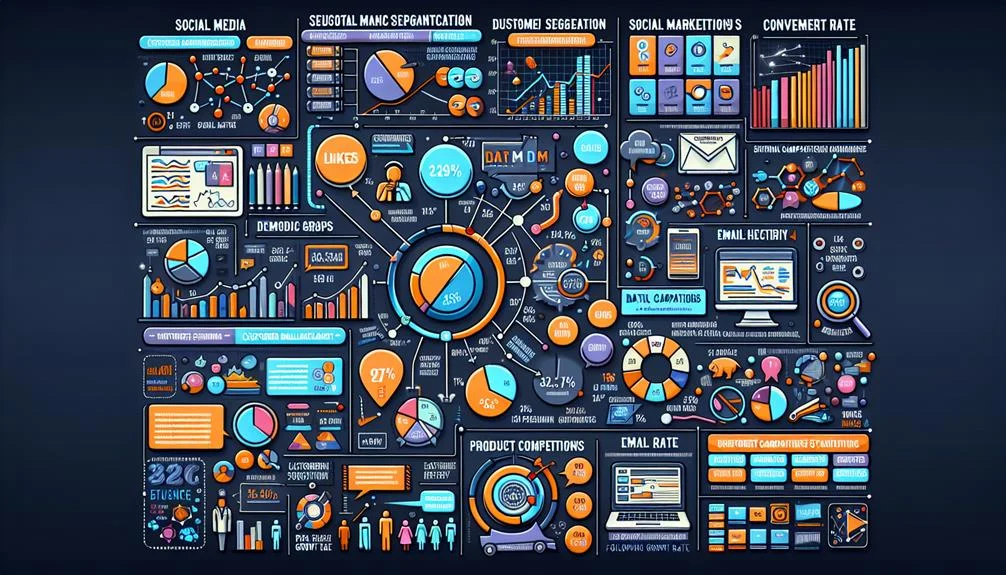Data science has revolutionized the landscape of marketing by offering unparalleled insights into consumer behavior and market trends. Through sophisticated algorithms and predictive analytics, data science enables marketers to craft highly targeted campaigns, optimize resources, and drive impactful decision-making processes.
The intersection of data science and marketing has not only transformed how businesses understand their customers but has also paved the way for innovative strategies that yield significant returns on investment. The utilization of data science, is a powerful tool that continues to reshape the industry, offering endless possibilities of data-driven strategies.
Key Takeaways
- Data science enables customer segmentation for personalized campaigns.
- It optimizes budgets and lead targeting strategies.
- Real-time interactions and sentiment analysis drive data-driven decisions.
- Enhanced ROI, customer loyalty, and profitability through data-driven strategies.
- Clustering algorithms predict trends and behavior patterns for hyper-personalized markets.
Data Science Workflow
The data science workflow is a structured process that encompasses key phases essential for the successful execution of data-driven strategies. Beginning with objective definition, this phase involves framing business problems, understanding data, and aligning goals with business objectives.
Frameworks like CRISP-DM provide a guide for structuring data science projects, guaranteeing that each phase is meticulously executed. By following this structured workflow, data science teams can effectively prepare data, build models using machine learning techniques, deploy solutions, and monitor performance to drive success.
Within this workflow, the primary focus is on using data to enhance customer experiences, predict trends, and optimize investments. The objective-driven approach ensures that the data science team remains aligned with business goals and continuously adapts strategies based on insights gained throughout the process.
Ultimately, the data science workflow plays a critical role in enabling hyper-personalized marketing strategies that resonate with customers and drive business growth.
Clustering in Marketing Data Science

Furthermore, at its core, clustering algorithms play a key role in data science by grouping customers based on shared behavior, preferences, and demographics.
Through customer segmentation facilitated by clustering techniques, marketers can tailor targeted marketing strategies and craft personalized campaigns that resonate with specific customer segments.
By analyzing behavior patterns and demographic preferences using clustering algorithms, businesses gain valuable insights into customer needs, enabling them to optimize product offerings and enhance customer engagement.
Additionally, clustering in data science allows for a deeper understanding of market trends, empowering marketers to adapt their strategies in real-time to capitalize on emerging opportunities.
This level of insight also enables the creation of hyper-personalized campaigns, leading to increased customer satisfaction and ultimately higher ROI.
Clustering algorithms in data science drive behavior analysis, facilitate customer segmentation, and pave the way for more effective and efficient strategies.
Ways of Data Science in Marketing

Utilizing data science methodologies enables businesses to leverage customer insights, optimize strategies, and drive impactful decision-making. Data science plays an essential role, such as customer segmentation, personalized campaigns, and predictive analytics.
By analyzing customer behavior and preferences, businesses can tailor their efforts to target specific segments effectively. Additionally, data science aids in optimizing budgets by identifying the most cost-effective channels and strategies for reaching target audiences.
Improving lead targeting through data science techniques enhances conversion rates and boosts sales. Real-time interactions with customers are facilitated by data-driven insights, allowing businesses to respond promptly to market trends and consumer needs. Sentiment analysis helps in understanding customer perceptions and tailor market messages accordingly.
Clustering algorithms further assist in grouping similar customers for targeted campaigns. Overall, data-driven strategies powered by data science lead to improved ROI, customer loyalty, and profitability.
Examples of Data Science in Marketing

Data science in marketing is exemplified through various industry leaders’ strategic applications, showcasing the pivotal role data analytics plays in driving personalized customer experiences and optimizing marketing efforts.
Companies like Airbnb utilize data science for personalized recommendations and dynamic pricing strategies, leveraging machine learning to analyze customer segments.
Netflix employs data science for content personalization and targeted marketing campaigns, utilizing predictive modeling to enhance the customer experience.
Spotify leverages data science to analyze user behavior and create tailored music recommendations through sophisticated recommendation engines.
Facebook harnesses data science for ad targeting, user engagement analysis, and performance optimization, enabling personalized recommendations based on customer insights.
Google utilizes data science for analytics, providing valuable customer insights and predictive modeling to optimize strategies and enhance the overall customer experience.
These examples highlight the diverse applications of data science, illustrating its significance in driving targeted campaigns and personalized interactions with customers.
Becoming a Marketing Data Scientist

To excel as a data scientist, one must possess a strong foundation in analytics tools such as SQL, R, Python, and Tableau to effectively analyze and model data. These skills are essential for extracting insights from consumer responses, sales call logs, customer service logs, and various external data sources.
Additionally, the ability to gather and interpret data on competitors, pricing, news, and consumer sentiment is paramount for making informed marketing decisions based on predictive and prescriptive models.
Skills Needed for Marketing Data Science
Proficiency in programming languages like Python or R is an essential requirement for individuals aspiring to excel as marketing data scientists. To thrive in this role, several key skills are necessary:
- Statistical Knowledge: Understanding statistical concepts is pivotal for interpreting data accurately and deriving meaningful insights for marketing strategies.
- Data Manipulation Skills: Proficiency in transforming and structuring data is crucial for cleaning and preparing datasets for analysis.
- Machine Learning Techniques: Knowledge of machine learning algorithms enables data scientists to build predictive models that forecast consumer behavior and optimize marketing campaigns.
- Decision-Making: The ability to utilize data-driven insights to make informed decisions is a cornerstone skill for marketing data scientists.
Harnessing data for strategic planning and campaign optimization is essential in driving successful marketing initiatives.
Role of Analytics Tools
A fundamental aspect of excelling as a marketing data scientist involves adeptly leveraging analytics tools such as SQL, R, Python, and Tableau for thorough data analysis within the field.
Data scientists utilize these tools to construct surveys, analyze consumer responses, sales call logs, and external data sources to derive actionable insights. By gathering data on competitors, pricing, news, and consumer sentiment, they make informed marketing decisions.
Additionally, building predictive and prescriptive models using machine learning algorithms aids in understanding consumer behavior and optimizing marketing strategies. The role of analytics tools in data science in marketing extends to utilizing customer data from various sources to drive effective marketing campaigns and improve customer engagement.
Moreover, these tools play a vital role in enhancing social media marketing strategies, enabling marketers to extract valuable insights and tailor their approaches for maximum impact.
Benefits of Data Science in Marketing

Data science offers a plethora of benefits, including targeted marketing campaigns that enhance customer engagement and increase ROI.
Improved customer segmentation through data-driven insights allows for more personalized and effective marketing strategies.
Furthermore, data-driven decision making empowers marketers to make informed choices that optimize campaign performance and drive business growth.
Targeted Marketing Campaigns
Effective strategies today rely heavily on leveraging data science to create targeted campaigns that resonate with customers on a personal level. By analyzing customer data and behavior, data science enables personalized messaging and tailored offers that cater to individual preferences.
Here are some key benefits of using data science in targeted campaigns:
- Enhanced Customer Segmentation: Data science allows marketers to segment customers effectively based on their characteristics and behaviors, leading to more targeted and relevant marketing efforts.
- Improved Customer Engagement: Targeted campaigns driven by data science have proven to increase customer engagement by delivering content that aligns with their interests and needs.
- Increased Conversion Rates: Personalized messaging and offers based on data-driven insights result in higher conversion rates as customers are more likely to respond positively to relevant marketing communications.
- Better Customer Retention: Identifying high-value customers through data analysis helps in predicting their behavior and adapting marketing strategies to enhance customer retention and loyalty.
Improved Customer Segmentation
Through the utilization of data science, businesses can achieve enhanced customer segmentation by delving into demographics, behaviors, and preferences to create targeted marketing strategies. By employing clustering algorithms, data science enables the grouping of customers based on similarities, facilitating personalized marketing campaigns that resonate with specific segments.
This tailored approach leads to higher engagement levels, increased conversions, and ultimately, improved customer satisfaction. Effective customer segmentation allows companies to craft messaging, product offerings, and pricing strategies that cater to the unique needs of each segment, resulting in a more meaningful connection with the target audience. Data science optimizes customer segmentation for better ROI, enhanced customer retention, and overall business growth.
| Benefits of Improved Customer Segmentation |
|---|
| Higher engagement |
| Increased conversions |
| Improved customer satisfaction |
Data-Driven Decision Making
Leveraging data science empowers businesses to make informed decisions driven by actionable insights, resulting in tangible improvements across key performance metrics. By embracing data-driven decision-making, companies can optimize marketing strategies and enhance various aspects of their operations:
- Enhanced Customer Acquisition and Retention: Utilizing data science in marketing can lead to a 15-20% increase in customer acquisition and retention rates.
- Improved Campaign Effectiveness and Customer Engagement: Companies leveraging data science witness a 10-15% enhancement in campaign effectiveness and customer engagement.
- Higher Conversion Rates: Implementing data science in marketing results in a 20-30% boost in conversion rates, translating into better ROI.
- Personalized Customer Experience: Data science enables a more tailored and personalized customer experience, fostering stronger relationships and loyalty.
These benefits showcase how data science revolutionizes the decision-making process, offering substantial advantages in driving growth, increasing efficiency, and fostering customer relationships.
Conclusion
In the intricate web of marketing, data science acts as a skilled weaver, intricately crafting personalized strategies and predicting trends to enhance customer experiences.
By segmenting customers, optimizing budgets, and enabling real-time interactions, data science transforms marketing into a dynamic and efficient process.
Like a masterful conductor orchestrating a symphony, data science harmonizes data-driven insights to create a melody of success and customer satisfaction in the marketing domain.





